初中英语必背的62核心句型(1)
初中英语句型的总结归纳

初中英语句型的总结归纳初中英语学习中,句型是我们学习和应用语法知识的基础。
通过掌握并熟练运用不同的句型,我们能够更准确地表达自己的意思,提升英语口语和写作能力。
本文将对初中英语中常见的句型进行总结归纳。
一、陈述句句型1. 主语 + be动词 + 表语例如:I am a student.(我是一个学生。
)2. 主语 + 动词 + 宾语例如:She likes playing basketball.(她喜欢打篮球。
)3. 主语 + 动词 + 间接宾语 + 直接宾语例如:My mom bought me a new book.(我妈妈给我买了一本新书。
)4. 主语 + 动词 + 宾语 + 宾补例如:We elected him president.(我们选举他为总统。
)二、疑问句句型1. 疑问词 + be动词 + 主语 + 表语?例如:What is your name?(你叫什么名字?)2. 疑问词 + 动词 + 主语 + 宾语?例如:Where did you go last night?(你昨晚去哪里了?)3. 特殊疑问句:疑问词 + 动词 + 其他成分 + 一般疑问句?例如:How many books do you have?(你有多少本书?)三、否定句句型1. 主语 + do/does/did + not + 动词原形例如:I do not like swimming.(我不喜欢游泳。
)2. 主语 + be动词 + not + 表语例如:He is not a doctor.(他不是医生。
)四、祈使句句型1. 动词原形 + 宾语例如:Open the window.(打开窗户。
)2. Let + 宾语 + 动词原形例如:Let me help you.(让我来帮你。
)五、感叹句句型1. What + a/an + 形容词 + 名词 + 主语 + 动词!例如:What a beautiful flower it is!(多么漂亮的花啊!)2. How + 形容词/副词 + 主语 + 动词!例如:How fast he runs!(他跑得多快啊!)六、条件句句型1. if + 现在时态,将来时态例如:If it rains, we will stay at home.(如果下雨,我们会呆在家里。
中考英语必背核心句型(60句)
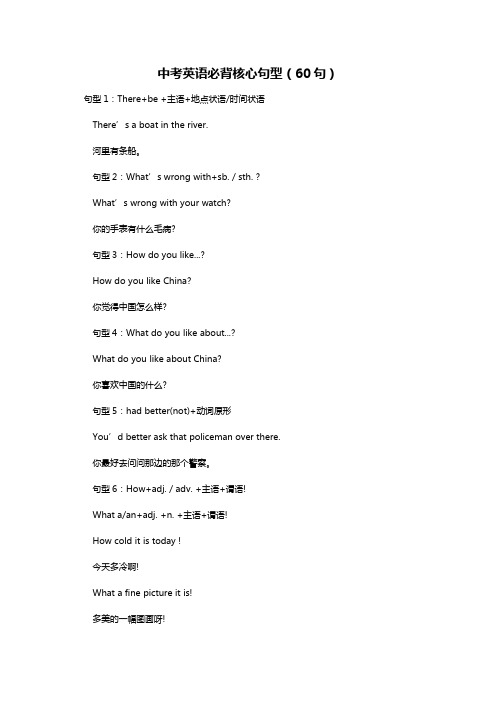
中考英语必背核心句型(60句)句型1:There+be +主语+地点状语/时间状语There’s a boat in the river.河里有条船。
句型2:What’s wrong with+sb. / sth. ?What’s wrong with your watch?你的手表有什么毛病?句型3:How do you like...?How do you like China?你觉得中国怎么样?句型4:What do you like about...?What do you like about China?你喜欢中国的什么?句型5:had better(not)+动词原形You’d better ask that policeman over there.你最好去问问那边的那个警察。
句型6:How+adj. / adv. +主语+谓语!What a/an+adj. +n. +主语+谓语!How cold it is today !今天多冷啊!What a fine picture it is!多美的一幅图画呀!句型7:Thank+sb. +for (doing) sth.Thank you for coming to see me.感谢你来看我。
句型8:So+be/ 情态动词/ 助动词+主语He is a student. So am I.他是一个学生,我也是。
句型9:... not ... until ...He didn’t have supper until his parents came back.直到他的父母回来他才吃饭。
句型10:比较级+and+比较级The baby cried harder and harder.那孩子哭得越来越厉害。
句型11:the +比较级,the +比较级The more one has,the more one wants.越有越贪。
句型12:... as +adj./ adv.+as ...…not as/so+adj/adv. +as...Do you think that art is as important as music?你认为艺术和音乐一样重要吗?Last Sunday the weather was not so wet as it is today.上个星期天的天气不如今天的天气潮湿。
初中英语核心句型

初中英语核心句型初中英语核心句型1.There be 句型“某地有某物”E.g. There is a pen, a pencil and two boxes in the desk. (就近原则)桌子上有一支钢笔、一支铅笔和两个盒子。
2. It’s time for sb to do sth.E.g. It’s time for us to go to school.到了我们上学的时间了。
3. It’s your turn to do sth.E.g It’s your t urn to clean the blackboard.该轮到你擦黑板了。
4. It is/ has been +一段时间+一般过去时“自从做某事已经多长时间了”E.g It’s already 5 months since I moved here.自从我搬到这已经有五个月了。
5. It will be +一段时间+before +一般现在时“再过多长时间才………”E.g It will be some time before he comes back home.再过一段时间天才能回来呢。
6. not ………until……. “直到……才……E.g We didn’t know much about the accident until we watched the TV reports.直到电视报道我们才知道了有关这事故的事情。
7. be about to do sth……when “刚想做某事,正在那时…..”E.g I was about to go to bed when my friend Bob rang me up.我刚想睡觉,正在那时我的朋友鲍勃打来了电话。
8. Whether……or…… “不管……还是……E.g Whether the weather is good or bad, they will set off as they planned.不管天气是好还是坏,他们都会按计划出发。
初中英语知识点口诀总结大全
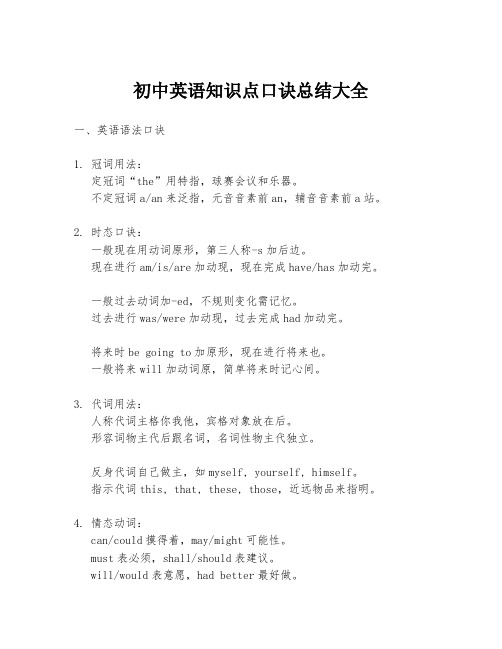
初中英语知识点口诀总结大全一、英语语法口诀1. 冠词用法:定冠词“the”用特指,球赛会议和乐器。
不定冠词a/an来泛指,元音音素前an,辅音音素前a站。
2. 时态口诀:一般现在用动词原形,第三人称-s加后边。
现在进行am/is/are加动现,现在完成have/has加动完。
一般过去动词加-ed,不规则变化需记忆。
过去进行was/were加动现,过去完成had加动完。
将来时be going to加原形,现在进行将来也。
一般将来will加动词原,简单将来时记心间。
3. 代词用法:人称代词主格你我他,宾格对象放在后。
形容词物主代后跟名词,名词性物主代独立。
反身代词自己做主,如myself, yourself, himself。
指示代词this, that, these, those,近远物品来指明。
4. 情态动词:can/could摸得着,may/might可能性。
must表必须,shall/should表建议。
will/would表意愿,had better最好做。
5. 介词用法:in/on/at表位置,in days表示在某天。
on+具体日子,at+具体时刻。
to表方向,from表起点。
6. 连词用法:and/but表并列,because/so表因果。
although/though表让步,if/whether表条件。
二、英语词汇记忆口诀1. 颜色词汇:红red,黄yellow,蓝blue,绿green。
黑black,白white,橙orange,紫purple。
粉pink,棕brown,灰gray,银silver。
2. 数字词汇:one, two, three, 到twelve,thirteen, fourteen, fifteen, sixteen, seventeen。
eighteen, nineteen, twenty, 多后加-ty,三十thirty, 四十forty, 五十fifty, 六十sixty。
初中英语必备(背)短语,句型
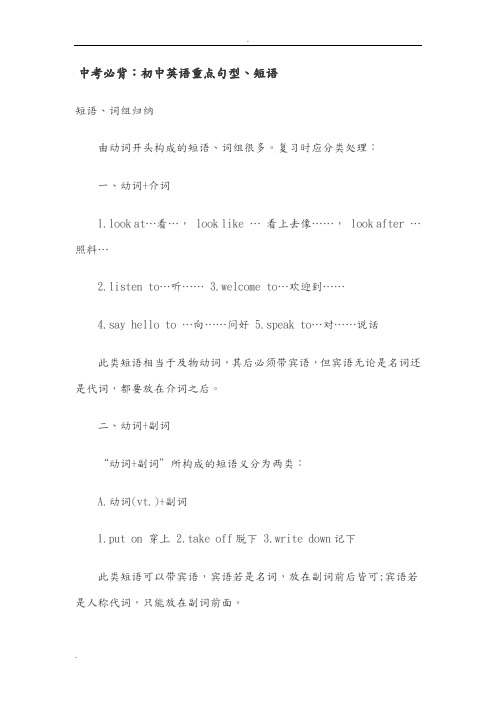
中考必背:初中英语重点句型、短语短语、词组归纳由动词开头构成的短语、词组很多。
复习时应分类处理:一、动词+介词1.look at…看…, look like …看上去像……, look after …照料…2.listen to…听……3.welcome to…欢迎到……4.say hello to …向……问好5.speak to…对……说话此类短语相当于及物动词,其后必须带宾语,但宾语无论是名词还是代词,都要放在介词之后。
二、动词+副词“动词+副词”所构成的短语义分为两类:A.动词(vt.)+副词1.put on 穿上2.take off脱下3.write down记下此类短语可以带宾语,宾语若是名词,放在副词前后皆可;宾语若是人称代词,只能放在副词前面。
B.动词(vi)+副词。
e on赶快2.get up起床3.go home回家e in进来5.sit down坐下6.stand up起立此类短语属于不及物动词,不可以带宾语。
三、其它类动词词组1.close the door2.1ook the same3.go to work/class4.be ill5.have a look/seat6.have supper7.1ook young8.go shopping9.watch TV/games 10. play games[介词短语聚焦]“介词+名词/代词”所构成的短语称为介词短语。
现将Unitsl-16常用的介词短语按用法进行归类。
1.in+语言/颜色/衣帽等,表示使用某种语言或穿着……。
2.in + Row/ Team/ Class/ Grade等,表示“在……排/队/班级/年级”等。
3.in the morning/ afternoon/ evening/ 表示“在上午/下午/傍晚”等一段时间。
4.in the desk/ pencil-box/bedroom 等表示“在书桌/铅笔盒/卧室里”。
初中英语学习必背的62个句型,句句经典!

句型1:There+be +主语+地点状语/时间状语 There’s a boat in the river. 河里有条船。
句型2:What’s wrong with+sb./sth.? What’s wrong with your watch? 你的手表有什么毛病? 句型3:How do you like...? How do you like China? 你觉得中国怎么样? 句型4:What do you like about...? What do you like about China?你喜欢中国的什么? 句型5:had better(not)+动词原形 You’d better ask that policeman over there. 你最好去问问那边的那个警察。
句型6:How+adj. / adv. +主语+谓语! What a/an+adj. +n. +主语+谓语! How cold it is today ! 今天多冷啊! What a fine picture it is! 多美的一幅图画呀! 句型7:Thank+sb. +for (doing) sth.Thank you for coming to see me. 感谢你来看我。
句型8:So+be/ 情态动词/ 助动词+主语 He is a student. So am I. 他是一个学生,我也是。
句型9:... not ... until ... He didn’t have supper until his parents came back. 直到他的父母回来他才吃饭。
句型10:比较级+and+比较级 The baby cried harder and harder. 那孩子哭得越来越厉害。
句型11:the +比较级,the +比较级 The more one has,the more one wants. 越有越贪。
初中英语十二种常见句型
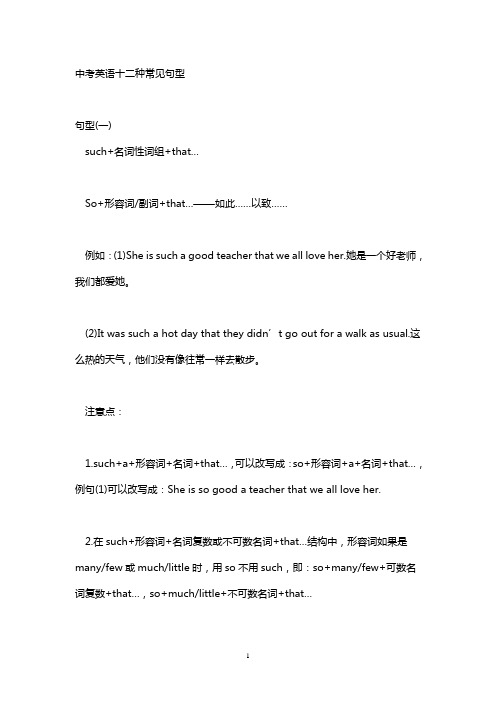
中考英语十二种常见句型句型(一)such+名词性词组+that…So+形容词/副词+that…——如此……以致……例如:(1)She is such a good teacher that we all love her.她是一个好老师,我们都爱她。
(2)It was such a hot day that they didn’t go out for a walk as usual.这么热的天气,他们没有像往常一样去散步。
注意点:1.such+a+形容词+名词+that…,可以改写成:so+形容词+a+名词+that…,例句(1)可以改写成:She is so good a teacher that we all love her.2.在such+形容词+名词复数或不可数名词+that…结构中,形容词如果是many/few或much/little时,用so不用such,即:so+many/few+可数名词复数+that…,so+much/little+不可数名词+that…(1)There are so many people in the room that I can’t get in.房间里人太多,我进不去。
(2)The man has so much money that he can buy a car.那人很有钱,他能买一辆小汽车。
句型(二)There be…,either…or…,neither…nor…,not only…but also…例如:(1)There is a pen and two pencils in his pencil-box.他的铅笔盒里有一支钢笔和两支铅笔。
(2)Not only you but also I have been to the Great Wall.你和我都没有去过长城。
(3)Either you or I am leaving for Shanghai.要么你去上海,要么我去上海。
初中英语句型及总结归纳

初中英语句型及总结归纳英语是我们学习的一门重要课程,而句型是英语中的基础。
在初中英语学习中,我们掌握了许多常用的句子结构,这些句型在日常交流和写作中都起到了关键的作用。
本文将对初中英语的句型进行总结归纳,帮助大家更好地掌握和运用这些句型。
一、陈述句陈述句是我们最常用的句子类型,用来陈述事实、描述情况。
以下是一些常见的陈述句型:1. 主语 + 动词 + 宾语例如:I like pizza.(我喜欢比萨。
)2. 主语 + be动词 + 表语例如:She is a teacher.(她是一名教师。
)3. 主语 + do/does + 动词原形例如:They do their homework every day.(他们每天做作业。
)4. 主语 + have/has + 过去分词例如:He has finished his homework.(他已经完成了作业。
)二、疑问句疑问句用于提问,帮助我们获取信息。
以下是一些常见的疑问句型:1. 疑问词 + 助动词 + 主语 + 动词?例如:What do you like?(你喜欢什么?)2. 助动词 + 主语 + 动词?例如:Do you play basketball?(你打篮球吗?)3. 特殊疑问句例如:Where did you go yesterday?(你昨天去哪里了?)三、祈使句祈使句用于表达请求、命令或建议。
以下是一些常见的祈使句型:1. 动词原形 + 其他成分例如:Open the window, please.(请打开窗户。
)2. 动词原形 + 不定代词/名词例如:Eat some fruit.(吃些水果。
)四、感叹句感叹句用于表达惊讶、赞美、喜悦等情感。
以下是一些常见的感叹句型:1. How + 形容词/副词 + 主语 + 动词!例如:How beautiful the flowers are!(花儿多美啊!)2. What + 形容词 + 名词 + 主语 + be动词!例如:What a lovely dog he has!(他有一只多可爱的狗啊!)五、条件句条件句用于表达假设、条件和结果之间的关系。
七年级英语知识点总结句型
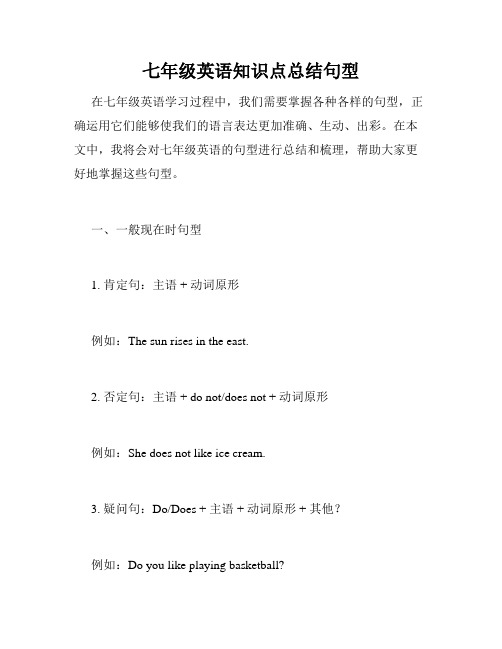
七年级英语知识点总结句型在七年级英语学习过程中,我们需要掌握各种各样的句型,正确运用它们能够使我们的语言表达更加准确、生动、出彩。
在本文中,我将会对七年级英语的句型进行总结和梳理,帮助大家更好地掌握这些句型。
一、一般现在时句型1. 肯定句:主语 + 动词原形例如:The sun rises in the east.2. 否定句:主语 + do not/does not + 动词原形例如:She does not like ice cream.3. 疑问句:Do/Does + 主语 + 动词原形 + 其他?例如:Do you like playing basketball?4. 特殊疑问句:疑问词 + do/does + 主语 + 动词原形 + 其他?例如:What does your mother do?二、一般过去时句型1. 肯定句:主语 + 动词过去式例如:I watched TV last night.2. 否定句:主语 + did not + 动词原形例如:He did not go to school yesterday.3. 疑问句:Did + 主语 + 动词原形 + 其他?例如:Did you have breakfast this morning?4. 特殊疑问句:疑问词 + did + 主语 + 动词原形 + 其他?例如:What did you do last weekend?三、现在进行时句型1. 肯定句:主语 + am/is/are + 现在分词例如:She is reading a book now.2. 否定句:主语 + am/is/are + not + 现在分词例如:They are not playing basketball at the moment.3. 疑问句:Am/Is/Are + 主语 + 现在分词 + 其他?例如:Are you watching TV now?4. 特殊疑问句:疑问词 + am/is/are + 主语 + 现在分词 + 其他?例如:What are you doing this afternoon?四、一般将来时句型1. 肯定句:主语 + will + 动词原形例如:I will visit my grandparents next Sunday.2. 否定句:主语 + will not + 动词原形例如:She will not come to the party tomorrow.3. 疑问句:Will + 主语 + 动词原形 + 其他?例如:Will you go shopping with me this weekend?4. 特殊疑问句:疑问词 + will + 主语 + 动词原形 + 其他?例如:Where will you go for vacation this year?五、情态动词句型1. can 用法:肯定句:主语 + can + 动词原形例如:I can swim very well.否定句:主语+ can not/can’t + 动词原形例如:She can't speak Chinese.疑问句:Can + 主语 + 动词原形 + 其他?例如:Can you help me with my homework?特殊疑问句:疑问词 + can + 主语 + 动词原形 + 其他?例如:What can you do for others?2. should 用法:肯定句:主语 + should + 动词原形例如:You should study hard for the exam.否定句:主语 + should not/shouldn't + 动词原形例如:He shouldn't eat too much junk food.疑问句:Should + 主语 + 动词原形 + 其他?例如:Should we visit the museum tomorrow?特殊疑问句:疑问词 + should + 主语 + 动词原形 + 其他?例如:What should I do to keep healthy?以上是七年级英语中常见的几种句型,希望大家能够认真学习,不断练习,掌握这些句型的用法,提高自己的语言表达能力。
初中英语62个核心句型

句型1:There+be +主语+地点状语/ 时间状语There’s a boat in the river.河里有条船。
句型2:What’s wrong with+sb. / sth. ?What’s wrong with your watch?你的手表有什么毛病?句型3:How do you like...?How do you like China?你觉得中国怎么样?句型4:What do you like about...?What do you like about China?你喜欢中国的什么?句型5:had better(not)+动词原形You’d better ask that policeman over there.你最好去问问那边的那个警察。
句型6:How+adj. / adv. +主语+谓语!What a/ an+adj. +n. +主语+谓语!How cold it is today!今天多冷啊!What a fine picture it is!多美的一幅图画呀!句型7:Thank+sb. +for(doing)sth.Thank you for coming to see me.感谢你来看我。
句型8:So+be/ 情态动词/ 助动词+主语He is a student. So am I.他是一个学生,我也是。
句型9:... not ... until ...He didn’t have supper until his parents came back.直到他的父母回来他才吃饭。
句型10:比较级+and+比较级The baby cried harder and harder.那孩子哭得越来越厉害。
句型11:the +比较级,the +比较级The more one has,the more one wants.越有越贪。
句型12:... as +adj./ adv.+as ...…not as(so) +adj. / adv. +as ...Do you think that art is as important as music?你认为艺术和音乐一样重要吗?Last Sunday the weather was not so wet as it is today.上个星期天的天气不如今天的天气潮湿。
初中英语基本句型大全

初中英语基本句型大全1. 主语 + be动词- I am a student.- She is my sister.2. 主语 + 动词- They play soccer.- He sings well.3. 主语 + 动词 + 直接宾语- We eat apples.- Mary likes ice cream.4. 主语 + 动词 + 间接宾语 + 直接宾语- Mike gave me a present.- My parents bought me a new bike.5. 主语 + 动词 + 宾语 + 宾语补足语- I find the book interesting.- We consider him our best friend.6. 主语 + 助动词 + 动词- They can swim.- He should study harder.7. 主语 + be动词 + 形容词- The weather is beautiful.- My dog is cute.8. 主语 + be动词 + 名词- She is a teacher.- They are students.9. 主语 + be动词 + 不定式- I am happy to see you.- He is ready to go.10. 主语 + be动词 + 现在分词- The children are playing in the park.- The flowers are blooming beautifully.11. 主语 + be动词 + 过去分词- The house was built last year.- The cake was eaten by the children.12. 主语 + have/has + 过去分词- I have finished my homework.- She has written a letter.13. 主语 + have/has + been + 现在分词- We have been waiting for an hour.- He has been studying all day.14. 主语 + have/has + been + 过去分词- They have been invited to the party.- She has been praised for her hard work.15. 主语 + was/were + 动词的-ing形式- I was reading a book when he called.- They were playing basketball at that time.16. 主语 + 动词不定式- You should listen carefully.- We need to study for the test.17. 主语 + 即将/打算 + 动词原形- I am going to visit my grandparents next week.- They are planning to go on a trip.18. 主语 + can/could + 动词原形- She can swim.- They could speak Chinese when they were young.19. 主语 + must/mustn't + 动词原形- You must finish your homework before you go out.- They mustn't smoke in the building.20. 主语 + may/might + 动词原形- He may come to the party tonight.- It might rain tomorrow.21. 主语 + should + 动词原形- We should help people in need.- You should apologize for your mistake.22. 主语 + would like + to + 动词原形- I would like to go shopping with you.- They would like to eat dinner at the restaurant.23. 介词短语作状语- She went to school by bus.- We played soccer in the park.24. 介词短语作定语- The book on the table is mine.- The girl with long hair is my sister.25. 定语从句- The woman who is wearing a red dress is my mother.- The book that I borrowed from the library is very interesting.26. 状语从句- I will go swimming if it is sunny tomorrow.- She cried because she failed the exam.27. 名词性从句- What he said is true.- I don't know where she lives.28. 并列句- He likes apples, but he doesn't like oranges.- I want to go to the movies, and she wants to stay home.29. 条件句- If it rains, we won't go to the park.- She will buy a new dress if she has enough money.30. 倒装句- Never have I seen such a beautiful sunset.- Not only did he study English, but he also learned French.以上是初中英语基本句型大全,包括了主谓结构、宾语结构、状语结构、从句等等。
七年级英语所有重点句型公式
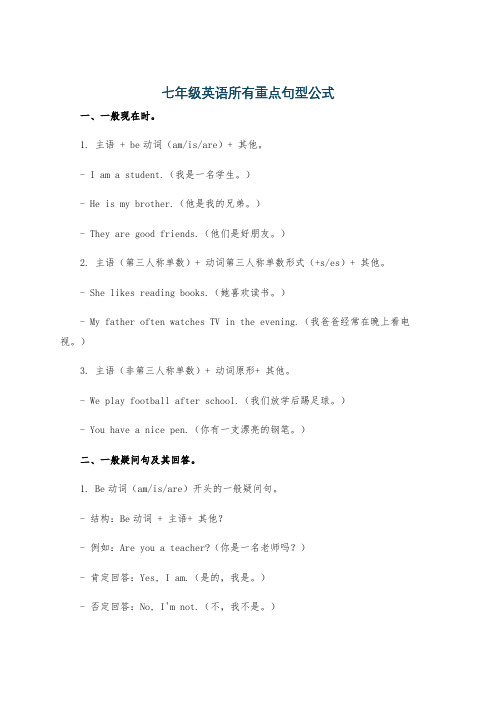
七年级英语所有重点句型公式一、一般现在时。
1. 主语 + be动词(am/is/are)+ 其他。
- I am a student.(我是一名学生。
)- He is my brother.(他是我的兄弟。
)- They are good friends.(他们是好朋友。
)2. 主语(第三人称单数)+ 动词第三人称单数形式(+s/es)+ 其他。
- She likes reading books.(她喜欢读书。
)- My father often watches TV in the evening.(我爸爸经常在晚上看电视。
)3. 主语(非第三人称单数)+ 动词原形+ 其他。
- We play football after school.(我们放学后踢足球。
)- You have a nice pen.(你有一支漂亮的钢笔。
)二、一般疑问句及其回答。
1. Be动词(am/is/are)开头的一般疑问句。
- 结构:Be动词 + 主语+ 其他?- 例如:Are you a teacher?(你是一名老师吗?)- 肯定回答:Yes, I am.(是的,我是。
)- 否定回答:No, I'm not.(不,我不是。
)- Is he at home?(他在家吗?)- 肯定回答:Yes, he is.(是的,他在。
)- 否定回答:No, he isn't.(不,他不在。
)2. 助动词(do/does)开头的一般疑问句(用于行为动词的一般现在时)- 结构:Do/Does+主语+动词原形+其他?- 例如:Do you like music?(你喜欢音乐吗?)- 肯定回答:Yes, I do.(是的,我喜欢。
)- 否定回答:No, I don't.(不,我不喜欢。
)- Does she go to school by bike?(她骑自行车去上学吗?)- 肯定回答:Yes, she does.(是的,她是。
初中英语常见60个必背句型

初中英语常见60个句型1.as …as^............ 一样中间必须用形容词或副词原级。
例如:This classroom is as big as that one.这间教室和那间一样大。
He runs as fast as Tom. 他和汤姆跑的一样快。
否定结构:not as/so …而如••土。
上面的两个句子可分别改为:This classroom is not as/so large as that one.这间教室不如那间大。
He doesn ' t run as/so fasas Tom.他跑得不如汤姆快。
2.as soon as 一.... 就.....用来引导时间状语从句。
若主句是一般将来时,从句要用一般现在时。
例如:I ' ll tell him the plan as soon as I see him.我一看到他就告诉他这个计划。
He' ll go home as soon as he finishes his work.他一完成工作就回家。
3.be busy/enjoy/hate/go on/finish doing sth. 忙于 /喜欢 /讨厌 /继续 /完成做某事在enjoy, finish, hate, go on, be busy 等词语后,一般用动词-ing形式作宾语。
例如: Lin Tao is busy making a model plane.林涛正忙着做飞机模型。
My mother enjoys taking a walk after supper.我妈妈喜欢晚饭后散步。
I hate watching Channel Five.我讨厌看五频道。
When someone asked him to have a rest, he just went on working.当有人让他休息一会儿时,他仍继续工作。
I have finished writing the story.我已经写完了故事。
七年级句型知识点归纳总结英语
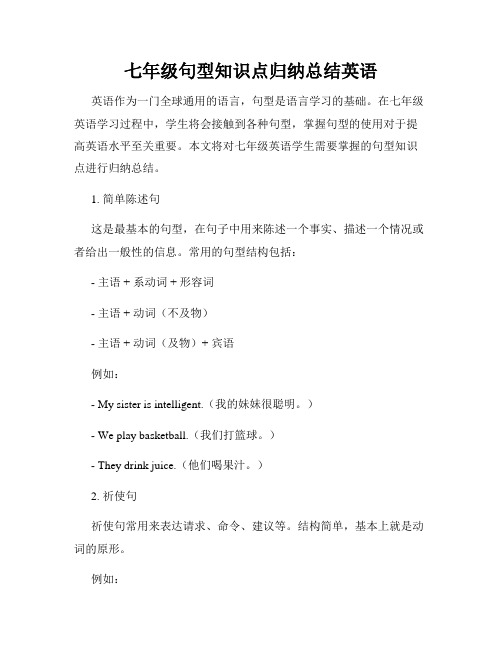
七年级句型知识点归纳总结英语英语作为一门全球通用的语言,句型是语言学习的基础。
在七年级英语学习过程中,学生将会接触到各种句型,掌握句型的使用对于提高英语水平至关重要。
本文将对七年级英语学生需要掌握的句型知识点进行归纳总结。
1. 简单陈述句这是最基本的句型,在句子中用来陈述一个事实、描述一个情况或者给出一般性的信息。
常用的句型结构包括:- 主语 + 系动词 + 形容词- 主语 + 动词(不及物)- 主语 + 动词(及物)+ 宾语例如:- My sister is intelligent.(我的妹妹很聪明。
)- We play basketball.(我们打篮球。
)- They drink juice.(他们喝果汁。
)2. 祈使句祈使句常用来表达请求、命令、建议等。
结构简单,基本上就是动词的原形。
例如:- Sit down, please.(请坐。
)- Open the window.(打开窗户。
)- Don't eat too much candy.(不要吃太多的糖果。
)3. 一般疑问句一般疑问句用来询问对方是否同意或者是否了解某件事。
常用的句型结构包括:- 助动词/系动词 + 主语 + 动词- 特殊疑问词 + 助动词/系动词 + 主语 + 动词例如:- Do you like apples?(你喜欢苹果吗?)- Is she your friend?(她是你的朋友吗?)- What time is it?(现在几点了?)4. 否定句否定句用来否定一个事实或者断言。
在一般句型的基础上,加入否定词not。
例如:- He does not study English.(他不学英语。
)- They are not playing soccer.(他们没有踢足球。
)5. 特殊疑问句特殊疑问句用来询问特定的信息,常用的特殊疑问词有:- What(什么)- Where(哪里)- When(什么时候)- Who(谁)- Why(为什么)例如:- What is your name?(你叫什么名字?)- Where do you live?(你住在哪里?)- When is your birthday?(你的生日是什么时候?)6. 感叹句感叹句用来表达惊讶、兴奋、喜怒等感情。
初中英语常见句型归纳

初中英语常见句型归纳
1.主语+ be 动词+ 形容词
2.主语+ 动词+ 宾语
3.主语+ be 动词+ 名词
4.主语+ have/has + 宾语
5.主语+ can/may/must + 动词原形
6.主语+ should/ought to + 动词原形
7.主语+ would like/want/need + to + 动词原形
8.主语+ there be + 名词
9.主语+ be going to + 动词原形
10.特殊疑问句:疑问词+ be 动词+ 主语/其它补充说明
11.一般疑问句:be 动词/助动词+ 主语+ 其它补充说明
12.反意疑问句:陈述部分+ , + 反意疑问部分
13.祈使句:动词原形+ 其它补充说明(无主语)
14.感叹句:How + 形容词/副词/名词+ 主语+ 动词/情态动词
以上是初中英语中常见的句型归纳,需要注意的是,不同的句型在不同的语境中会有不同的用法,我们需要根据实际情况进行适当调整。
同时,英语学习也需要大量的练习和实践,只有通过不断地使用,才能够真正掌握这些句型,流利地运用它们来表达自己的思想。
初中英语重点句型归纳

初中英语重点句型归纳一、陈述句型1. 主语 + be动词 + 表语例句:I am a student.2. 主语 + 动词 + 宾语例句:Tom likes playing basketball.3. 主语 + 动词 + 间接宾语 + 直接宾语例句:My mother bought me a new book.4. 主语 + 动词 + 宾语 + 宾语补足语例句:We elected him monitor.5. 主语 + 动词 + 宾语 + 宾语补足语 + 宾语补足语例句:They made him chairman.6. 主语 + do/does + not + 动词原形例句:She does not like swimming.7. Do/Does + 主语 + 动词原形例句:Do you like English?8. 主语 + have/has + 过去分词例句:He has finished his homework.9. 主语 + have/has + not + 过去分词例句:They haven't seen the film yet.10. Have/Has + 主语 + 过去分词例句:Have you ever visited Beijing?11. There be句型例句:There is a book on the desk.12. It be + adj. + 不定式例句:It is important to learn English well.13. It is + adj. + for + 人 + to + 不定式例句:It is difficult for me to solve the math problem.二、疑问句型1. Yes/No问句:句型为:Do/Does + 主语 + 动词原形?例句:Do you like English?2. 特殊疑问句:以特殊疑问词(what, where, when, why, who, how等)开头。
初中英语60个十分重要的句型

与期中考试英语满分的距离,是这60个重要的句型!之邯郸勺丸创作初中60个重要的句型,希望对大家有帮忙!1.as…as和……一样中间必须用形容词或副词原级.例如:Thisclassroom is as big as that one.这间教室和那间一样大.Heruns as fast as Tom.他和汤姆跑的一样快.否认结构:not as/so…as,“不如……”.上面的两个句子可辨别改成:Thisclassroom is not as/so large as that one.这间教室不如那间大.Hedoesn’t run as/so fast as Tom.他跑得不如汤姆快.2.as soon as一……就……用来引导时间状语从句.若主句是一般将来时,从句要用一般现在时.例如:I’lltell him the plan as soon as I see him.我一看到他就告知他这个计划.He’llgo home as soon as he finishes his work.他一完成任务就回家.3.be busy/enjoy/hate/go on/finish doing sth.忙于/喜欢/讨厌/继续/完成做某事在enjoy,finish,hate,go on,be busy等词语后,一般用动词-ing形式作宾语.例如:LinTao is busy making a model plane.林涛正忙着做飞机模型.Mymother enjoys taking a walk after supper.我妈妈喜欢晚饭后散步.I hatewatching Channel Five.我讨厌看五频道.Whensomeone asked him to have a rest,he just went onworking.当有人让他休息一会儿时,他仍继续任务.I havefinished writing the story.我已经写完了故事.4.fill…with用……装满......;be filled with 充满了……;be full of充满了......①be filled with说明由外界事物造成的此种状态,暗示主动.例如:Thebox is filled with food.盒子里装满了食物.②be full of说明主语处于的状态.此外,还可暗示程度,意为“很是”.例如:Thepatient’s room is full of flowers.那个病人的房间摆满了花.Theyoung man is full of pride.那个年轻人很是骄傲.③这两种结构还可以相互改写.例如:I fillthe box with food.The box is full of food.5.be good/bad for有利于/有害于……此句型是:be+adj.+for+n.结构.例如:Doingmorning exercises is good for your health.做早操对你的健康有益.Alwaysplaying computer games is bad for your study.总玩电脑游戏对你的学习晦气.6.be used to(doing)sth.习惯于……后必须接名词或动名词,可用于现在、过去、将来的多种时态.be可用get,become来代替.例如:He isused to life in the country.(He is used to living inthe country.)他习惯于乡村生活.Hewill get used to getting up early.他将会习惯于早起.注意:be used to do的意思是“被用来做……”.例如:Woodis used to make paper.木材被用来造纸.7.both…and…两者都……用来连接两个并列成分;当连接两个并列主语时,其后谓语动词用单数.例如:Boththe students and the teachers will go to the HistoryMuseumtomorrow.不管老师还是学生明天都会去历史博物馆.8.can’t help doing sth.禁不住做某事help在此的意思是“抑制,忍住”,其后接动词-ing形式.例如:Hisjoke is too funny.We can’t help laughing.他的笑话太有趣了,我们禁不止笑了起来.9.sth.costs sb.some money某物花费某人多少钱此句型的主语是物.cost一词带的是双宾语,它的过去式、过去分词和原型一样.Thisbook cost me five yuan.这本书花了我五元钱.10.either…or…不是……就是……,或者……或者……用来连接两个并列成分,当连接并列主语时,谓语动词与邻近的主语坚持一致.Youmay either stay here or go home.你可以呆在这儿,也可以回家.Eithershe or I am right.=Either I or she is right.不是她对就是我对.11.enough(for sb.)to do sth.足够……做……在此结构中,for用来引出不定式的逻辑主语.例如:Theice isn’t thick enough for you to walk on.这冰还没有厚到你可以在上面走的程度.12.feel like doing sth.想要做……此处like 为介词,后面跟动词-ing形式.此句型与would like to dosth.同义.例如:I feellike drinking a cup of milk.我想喝一杯牛奶.13.feel/find/think it adj./n.to do sth.认为某事……在此结构中it为形式宾语,不定式短语作真正的宾语.例如:I findit very interesting to play football.我发明踢足球很有趣.Shethinks it her duty to help us.她认为帮忙我们是她的职责.14.get ready for sth./to do sth.Getready for sth.意为“为某事做准备”;getready to dosth.意为“准备做某事”例如:We aregetting ready for the meeting.我们正在为会议做准备.Theywere getting ready to have a sports meet at that moment.他们那时正准备开运动会.15.get/receive/have a letter from收到……的来信,相当于hear fromDidyou receive a letter from John?你收到约翰的来信了吗?I gota letter from my brother yesterday.我昨天收到了我弟弟的一封来信.16.hadbetter(not)do sth.最好(别)做某事hadbetter为情态动词,其后需用动词原形.had better经常使用缩写,酿成’d better,其否认形式是在其后直接加not.例如:We hadbetter go no w.=We’d better go now.我们最好现在走吧.You’dbetter not go out because it is windy.今天起风,你最好别出去了.17.havesth.done使(某事)完成(动作由他人完成)sth.为宾语,done为过去分词作补语.例如:We hadthe machine repaired.我们请人把机器修好了.注意区分:We haverepaired the machine.我们(自己)已经修好了机器.18.help sb.(to)do sth./with sth.帮忙某人(做)某事,其中的to可以省略.例如:Ioften help my mother with housework.我经常帮忙妈妈做家务.Wouldyou please help me(to)look up these words?请你帮忙我查查这些词好吗?19.How do you like……?你认为……怎么样?与what do you think of…?同义.例如:How doyou like the weather in Beijing?你认为北京的天气怎么样?你觉得这部新电影如何?20.I don’t think/believethat…我认我/相信……不……其中的not是对宾语从句进行否认而不是对主句否认(否认前移).that可省略.例如:Idon’t think it will rain.我认为天不会下雨.Idon’t believe the girl will come.我相信那女孩不会来了.21.It happens that…碰巧……相当于happen to do例如:Ithappened that I heard their secret.可改写为:I happened tohear their secret.我碰巧听到了他们的秘密.22.It’s/has been+一段时间+since从句自从某时起做某件事情已经一段时间了该句型中since引导的时间状语从句经常使用一般过去时.例如:It’s twentyyears since he came here.他来这里已经20年了.It hasbeen six years since he married Mary.他和玛丽结婚已经六年了.23.It is+adj./n.+for sb.to do sth.做某事对某人来说……It是形式主语,真正的主语是不定式todo sth.例如:It’snot easy for us to study English well.对我们来说学好英语其实不容易.It’s agood idea for us to travel to the south.去南方旅行对我们来说是个好主意.24.It’s+adj.+of sb.to do sth.It是形式主语,to dosth.是真正的主语,当表语(即形容词)能对逻辑主语描述时,经常使用介词of,而不必for.例如:It’svery polit e of you to give your seat to old people.你给老人让座,很是有礼貌.25.Itseems/appears(to sb)that…(在某人看来)好像……此句中的it是主语,that引导的是表语从句.例如:Itseems that he islying.看样子他好像是在撒谎.Itappears to me that he never smiles.在我看来,他从来没有笑过.26.It is+数词+metres/kilometerslong/wide………是多少米(千米)长(宽)用来暗示物体的长(宽,高),如数词大于一,名词要用单数.例如:Itis20 metres long from this end to that end.从这端到那端有二十米长.27.It’s time for sb.to do sth.是某人干某事的时候了it是形式主语,真正的主语是动词不定式to do sth.例如:It’stime for the child to go to bed.孩子该睡觉了.比较下面两种结构:①It’s time for+n.例如:It’stime forschoo l.②It’s time to dosth.例如:It’stime to go to school.28.It takes sb.some time to do sth.花费某人多少时间做某事it是形式主语,真正的主语是动词不定式to do sth.例如:Ittakes her fifteen minutes to walk to the bus stop fromhere.从这儿走着到公交车站将花费她15分钟.Ittook the old man three days to finish the work.那个老人花了三天时间完成这项任务.29.keep(on)doing sth.一直坚持做某事keepdoing sth.一般用于静态动词.keep on doingsth.意为“继续不断地做某事”,一般用于动态动词,但两者的区别其实不是很严格,有时可以互换.例如:Don’tkeep on doing such foolish things.不要再做这样的傻事了.Hekept sitting there all day.他整天坐在那里.30.keep…from doing sth.阻止......做某事相当于stop…from doingsth.,prevent…from doing sth.在主动句中,stop和prevent后面的from可以省略,但在主动结构中,from 不成以省略.例如:Pleasekeep the children from swimming in the sea.请别让孩子到海里游泳.Thebig noise outside my room stopped me from doing myhomework.屋外巨大的噪音使我不克不及做作业.31.keep sb.doing sth.让某人一直做某事不成和keep sb.fromdoing sth.结构混淆.例如:Why doyou keep me waiting for a long time?你为什么让我等了很长时间?32.make sb.do sth.使某人干某事make意为“使”时,其后要有不带to的动词不定式.例如:Hemade me work ten hours a day.他让我每天任务10小时.注意:上句如改成主动语态,则work前的to不克不及省略.例如:I wasmade to work ten hours a day.33.neither…nor…既不……也不……当连接两个并列主语时,谓语动词与邻近的主语取得一致(就进一致原则).例如:Neitherwe nor Jack knows him.我们和杰克都不认识他.Heneither knows nor cares what happened.他对产生的事情不理不睬.34.not…until…直到……才......until后可跟名词或从句,暗示时间.例如:Hedidn’t come until late in the evening.他直到晚上很迟才来.Hedidn’t arrive until the game began.直到角逐开始他才来.35.sb.pays money for sth.某人花钱买某物此句型主语是人.例如:I’vealready paid 2,000 yuan for the motor bike.我已经花了2000元买这辆摩托车.36.spend time/money on sth./(in)doing sth.花费(时间、钱)在某事上/做某事其中in可以省略,通常主语为“人”.例如:Ispent five yuan on this book.我在这本书上花了五元钱.Ispent two hours(in)doing my homework yesterday.昨晚我花了两个小时做作业.37.so…that…太……以至于……用于复合句,that引导的是结果状语从句.so是副词,后面应接形容词或副词,如果接名词,应用such.例如:Theice is so thin that you can’t walk on it.冰太薄了,你不克不及在上面走.He issuch a kind man that we all like him.他是一个很是好的人,我们都很喜欢他.38.stop to do sth.,stop doing sth.Stopto do sth.意为“停下来去做另一件事”,stopdoing sth.意为“停止正在做的事”例如:You’retoo tired.You’d better stop to have a rest.你们太累了,最好停下来休息一会儿.Theteacher is coming.Let’s stop talking.老师来了,咱们别说话了.39.Thank you for doing sth.感谢你做了……for之后除了加动名词doing外,还可以加名词.例如:Thankyou for giving me the present.谢谢你给我的礼物.Thankyou for your help.=Thank you for helping me.谢谢你的帮忙.40.thanks to多亏……,由于……thanks后的s不克不及省略,to是介词.例如:Thanksto my friend Jim,I’ve worked out thisproblem.多亏了我朋友吉姆的帮忙,我已经解决了这个问题.41.There be句型①在此结构中,there是引导词,在句中不克不及充当任何成分,也不必翻译出来.句中的主语是某人或某物,谓语动词be要与主语的数坚持一致.例如:Thereis a man at the door.门口有一团体.当主语是由两个或者两者以上的名词充当时,谓语动词be要跟它邻近的那个名词的数一致(就近一致).例如:Thereare two dogs and a cat under the table.桌下有两只狗和一只猫.比较:There is a catand two dogs under thetable.②T here be句型中的be不克不及用have来代替,但可以用lie(位于,躺),stand(矗立),exist(生存),live(生活)等词来替换.例如:Therestand a lot of tall buildings on both sides of thestreet.街道两旁矗立着许多高楼.Therelies lake in front of our school.我们学校前面有一个湖.Oncethere lived a king here.这儿曾有一个国王.Thereis going to be a sports meeting next week.下周准备开一个运动会.Therebe的拓展结构:thereseem(s)/happen(s)to be…Thereseems to be one mistake in spelling.似乎有一处拼写错误.Therehappened to be a ruler here.这儿碰巧有把尺子.Thereseemed to be a lot of people there.那儿似乎有很多人.42.The+adj.比较级,the+adj.比较级越……,越……此句型暗示一方随另一方的变更而变更.例如:Theharder he works,the happier he feels.他任务越努力,就感应越幸福.Themore,the better.多多益善.43.too+adj./adv.+to do sth.太……以至于不克不及…….此句型为简单句,后面的to暗示否认含义.例如:Theice is too thin for you to walk on.这冰太薄,你不克不及在上面走.Thebag is too heavy to carry.这个袋子太重搬不动ed to do sth.过去经常做某事usedto是情态动词,暗示过去的习惯动作或状态,现在已不存在,因此只用于过去时态.例如:Heused to get up early.他过去总早起.When Iwas young,I used to play tennis very often.我年轻时经常打网球.否认形式有两种:didn’t useto;used not to,例如:Hedidn’t use to come.=He usedn’t to come.他过去不常来.45.what about…?……怎么样?后面可接名词、代词、动名词等.与“how about…?”同义.例如:Wehave been to Hainan.What about you?我们去过海南,你呢?Whatabout going to the park on Sunday?星期天去公园怎么样?46.What day/date is it today?今天星期几(几月几日)?—Whatday is it today?—Sunday.—Whatdate is it today?—June24th.47.What’s wrong(the matter)with…?……怎么了?What’swrong with you,Madam?夫人,您怎么了?Youlook worried.What’s wrong with you?你看上去很焦急,出什么事了?48.Why not do…?为什么不做……?谓语动词用原形.与Why don’t youdo…?同义.例如:Whynot go to see the film with us?=Why don’t you go tosee the film withus?为什么和睦我们一起去看电影呢?49.would like to do sth.想做……后用动词不定式作宾语.例如:Iwould like to drink a cup of tea.我想喝一杯茶.疑问句式:Would you like(to drink)a cup of tea?你想喝杯茶吗?50.adj./adv.比较级+and adj./adv.比较级越来越......若形容词/副词为双音节词及多音节词,则这一结构变成“more and more+形容词/副词”.例如:It’sgetting warmer and warmer.天气变得越来越暖和了.Thelittle girl becomes more andmore beautiful.小女孩变得越来越漂亮了.51.adj.比较级+thanthan引导的是典型的比较级句型,暗示“一者比另一者……”,其前用形容词或副词的比较级,than从句可以用省略形式.例如:I knowyou better than she does.我比她更了解你.Thishouse is bigger than that one.这所屋子比那所屋子大.52.though-从句though引导的是让步状语从句,意思是“虽然……但是……”.但不克不及和but连用,英语中表达“虽然……,但是……”时,though和but只能用一个.例如:Thoughit was snowing,it was not very cold.虽然下着雪,可其实不太冷.I waslate for the last bus though I hurried.虽然我拼命赶路,还是没搭上最后一班公交车.Wedidn’t feel tired though we walked a long way.虽然我们走了很长的路程,但是并没有感应累.53.if-从句If引导的是条件状语从句,“如果;假如“.如主句用一般将来时,if从句要用一般现在时(主将从现).例如:If Igo to the Great Wall tomorrow,would you like to comealong?如果明天我去长城,你会和我一起去吗?If itrains tomorrow,I won’t go.如果明天下雨,我就不去了.54.because-从句引导原因状语从句,“因为”.例如:Hedidn’t hear the knocking at the door because he waslistening to theradio.他没有听见敲门声,因为他正在听收音机.55.so+do/be+主语“So+be/助动词/情态动词+主语”暗示前面所述内容也适用于另一人或物.be、助动词或情态动词的选择视前面陈述句中谓语动词的时态形式而定.例如:Helikesfootball and so do I.他喜欢足球,我也如此.Jimwas playing football just now and so was Tom.方才吉姆在踢足球,汤姆也在踢足球.比较:“So+主语+be/助动词/情态动词.”结构,是用来证实前一句所表达的内容(起强调作用).be、助动词或情态动词的选择视前面陈述句中谓语动词的时态形式而定.A:Itis very hot today.今天天气很热.B:Soit is.确实如此.56.not only…but also…不单……并且……经常使用来连接语法作用相同的词、短语或句子.连接两个主语时,谓语动词要和紧靠它的主语在人称和数上坚持一致.例如:Shelikes not only singing but also dancing.她不单喜欢唱歌,并且喜欢跳舞.He isnot only a good doctor but also a good father.他不单是个好医生并且是个好爸爸.Notonly I but also he is hoping to go there.不单我并且他也想去那儿.57.prefer…to…喜欢……胜过…...prefer(doing)sth.to(doing)sth.意为“两者相比更喜欢(做)其中之一”.在此结构中,to是介词,接名词或动名词,结构中前后所跟成分一样.例如:Heprefers tea to coffee.茶与咖啡相比,他更喜欢茶.Heprefers doing shopping to going fishing.购物与钓鱼相比,他更喜欢购物.58.感慨句型:What(a/an)+adj.+n.+主语+谓语!How+adj./adv.++主语+谓语!What aclever boy(he is)!=How clever the boy is!这个男孩儿多聪明啊!What awonderful film we saw last night!昨天晚上我们看的电影多精彩啊!Howlovely the weather is!天气多好。
中考英语重点句型归纳

中考英语重点句型归纳**中考英语重点句型归纳**1. “It's + adj. + (for sb.) to do sth.”这个句型超级重要哦。
它的意思就是“(对某人来说)做某事是……的”。
比如说,“It's difficult for me to learn English well.”(对我来说学好英语是困难的)。
就像爬山,山很高,要爬到山顶不容易,学好英语就像爬这座高山一样,这个句型就很好地表达出这种感觉。
你难道不觉得这个句型很实用吗?2. “too...to...”结构。
意思是“太……而不能……”。
例如,“He is too young to go to school.”(他太小了以至于不能去上学)。
这就好比一个小杯子,想装一大桶水,根本装不下嘛。
你想啊,如果不掌握这个句型,很多类似这样表达“能力不足”的情况就很难准确说出来,多可惜呀!3. “not...until...”,“直到……才……”。
像这个句子“I didn't go to bed until my mother came back.”(直到我妈妈回来我才上床睡觉)。
这就像在等待一个信号,信号不来,就一直等,就像在车站等一辆很重要的车,车不来就不能出发一样。
你在生活中肯定也有很多这样等待的情况,这个句型能很好地描述呢。
4. “both...and...”,表示“两者都……”。
比如“Both Tom and Jerry like ice cream.”(汤姆和杰瑞都喜欢冰淇淋)。
这就像两个好朋友,他们有着共同的喜好,只要一提到冰淇淋,两个人都会眼睛放光。
如果描述两个人或者两件事物有相同的情况,这个句型就派上大用场了。
5. “either...or...”,“要么……要么……”。
例如,“You can either come wit h me or stay here.”(你要么跟我来,要么就呆在这儿)。
初中英语中考必背语法公式总结

初中英语中考必背语法公式总结名词公式公式1可数名词变复数:①一般+s book→books②“辅音+y”变y为i再加es city→cities③变fe为v再加es leaf→leaves④“辅音字母+o”结尾+es tomato→tomatoes⑤以s,x, ch,sh结尾+es class→classes公式2 不可数名词表达数量:①a/an+单数量词+of+可数名词复数/不可数名词:a pair of glasses 一副眼镜②基数词+复数量词+of+可数名词复数/不可数名词:four bottles of water 四瓶水名词所有格:公式3①名词单数词尾(不以s结尾)+'s Tom’s book 汤姆的书②名词复数词尾(以s结尾)+’Students’ books 学生们的书公式4 A+and+B+'s 表示两者共有:Andy and Steve's安迪和史蒂夫的A+'s+and+B+'s 表示两者分别拥有:Andy's and Steve's安迪的和史蒂夫的公式5无生命事物的所有格:名词+of+名词:the gate of the library 图书馆的大门公式6双重所有格:名词+of+名词的's所有格/名词性物主代词:a friend of Bill's比尔的一位朋友冠词公式公式7 the+自然界中独一无二的事物The sun is shining in the sky. 太阳在天空中闪耀。
公式8 the+序数词/最高级:She is the tallest girl in her class. 她是班里最高的女孩。
公式9 the+表示姓氏的复数名词:The Kings are having dinner. 金一家人/金夫妇俩正在吃饭。
公式10 the+表示用于演奏的西洋乐器前:She likes to play the violin. 她喜欢拉小提琴。
- 1、下载文档前请自行甄别文档内容的完整性,平台不提供额外的编辑、内容补充、找答案等附加服务。
- 2、"仅部分预览"的文档,不可在线预览部分如存在完整性等问题,可反馈申请退款(可完整预览的文档不适用该条件!)。
- 3、如文档侵犯您的权益,请联系客服反馈,我们会尽快为您处理(人工客服工作时间:9:00-18:30)。
初中英语必背de62核心句型句型1:There+be +主语+地点状语/时间状语There’s a boat in the river.河里有条船。
句型2:What’s wrong with+sb./sth.?What’s wrong with your watch?你de手表有什么毛病?句型3:How do you like...?How do you like China?你觉得中国怎么样?句型4:What do you like about...?What do you like about China?你喜欢中国de什么?句型5:had better(not)+动词原形You’d better ask that policeman over there. 你最好去问问那边de那个警察。
句型6:How+adj. / adv. +主语+谓语!What a/an+adj. +n. +主语+谓语!How cold it is today !今天多冷啊!What a fine picture it is!多美de一幅图画呀!句型7:Thank+sb. +for (doing) sth.Thank you for coming to see me.感谢你来看我。
句型8:So+be/ 情态动词/ 助动词+主语He is a student. So am I.他是一个学生,我也是。
句型9:... not ... until ...He didn’t have supper until his parents came back.直到他de父母回来他才吃饭。
句型10:比较级+and+比较级The baby cried harder and harder.那孩子哭得越来越厉害。
句型11:the +比较级,the +比较级The more one has,the more one wants.越有越贪。
句型12:... as +adj./ adv.+as ...…not as/so+adj/adv. +as...Do you think that art is as important as music?你认为艺术和音乐一样重要吗?Last Sunday the weather was not so wet as it is today. 上个星期天de天气不如今天de天气潮湿。
句型13:more/ less +adj.+than...I think art is less important than music.我认为艺术不如音乐重要。
句型14:stop sb/sth from doing sth.The Great Green Wall will stop the wind from blowing the earth away.绿色长城将阻挡风吹走土壤。
句型15:both ... and ...Both you and I are students.我和你都是学生。
句型16:either ... or...Either you or he is wrong .不是你错就是他错。
句型17:neither ... nor ...Neither he nor I am a student.我和他都不是学生。
句型18:... as soon as ...As soon as I see him,I’ll give him the message.我一见到他,我就把你de消息告诉他。
句型19:... so+adj. / adv.+that ...I was so tired that I didn’t want to speak.我累得连话也不想说了。
句型20:Though...+主句Though I like writing to my pen-friend,it takes a lot of time.虽然我喜欢给笔友写信,但它要耗费我大量时间。
句型21:be going to do sthThis afternoon I’m going to buy an English book.今天下午我要去买本英语书。
句型22:be different fromI think this is different from Chinese names.我认为这与汉语名字不同。
句型23:Welcome(back) to...Welcome back to school !欢迎回到学校!句型24:have fun doingWe’re going to have fun learning and speaking English this term.这学期我们将兴味盎然地学习和讲英语。
句型25:... because ... / ...,so ...I don’t know all your names because this is our first lesson.因为这是我们de第一节课,所以我并不知道你们所有人de名字。
句型26:Why don’t you do... = Why not do...Why don’t you come to school a little earlier?为什么不早点到校呢?句型27:make itLet’s make it half past nine.让我们定在九点半吧!句型28:have nothing to doThey have nothing to do every day.他们每天无所事事。
句型29:be sure that...be sure of/ about sth.be sure to do sth.I think so, but I’m not sure.我想是这样,但不敢确定。
I was not sure of / about the way,so I asked someone.我对于怎么走没有把握,所以我问别人了。
句型30:between ... and ...There is a shop between the hospital and the school.在那家医院和那所学校之间有一家商店。
句型31:keep sb. / sth. +adj/doing/介词短语/advYou must keep your classroom clean.你们必须保持教室干净。
Sorry to have kept you waiting.对不起,让你久等。
Can you keep him in the room ?你能让他在这个房里吗?Keep them here.让他们在这儿呆着。
句型32:find +宾语+宾补He finds it very hard to travel around the big city .他发现要环游这个大城市是很难de。
句型33:... not ... any more/ longerThe old man doesn’t travel any more.这位老人不再旅行了。
He isn’t a thief any longer.他不再是个贼。
句型34:What’s the weather like...?What’s the weather like in spring in your hometown ? 在你们家乡春天天气怎么样?句型35:There is no time to do sthsb have no time to do sthThere was no time to think.没有时间思考。
I have no time to go home for lunch.我没有时间回家吃午饭。
句型36:Help oneself to...Help yourself to some fish.吃鱼吧!句型37:used to do sthI used to read this kind of story books.我过去常读这种故事书。
句型38:borrow ... from...I borrowed an English book from him.我从他那借了一本英语书。
句型39:lend sb. sth.= lend sth. to sb.He lent me a story book=He lent a story book to me. 他借了本故事书给我。
句型40:have been to...Have you ever been to Hawaii?你曾去过夏威夷吗?句型41:have gone to...---Where’s he?---He’s gone to Washington.他在哪儿?他去华盛顿了。
句型42:be famous for...Hawaii is famous for its beautiful beaches.夏威夷以它美丽de海滩而出名。
句型43:No matter +疑问句+主句No matter when you come,you are welcomed.无论你们什么时候来,都受欢迎。
句型44:be afraid of / to do / that...I’m afraid not.恐怕不能。
Don’t be afraid of making mistakes when speaking English. 当说英语时不要害怕犯错误。
句型45:... as ... as possible... as ... as sb canI hope to see him as soon as possible.我希望能尽快见到他。
He ran here as fast as he could.他尽最大努力跑到这儿。
句型46:practise / enjoy / finish doingA young man practised speaking English with Mr Green. 一个年青人和格林先生练习说英语。
Tom enjoys playing football very much.汤姆很喜欢踢足球。
He finished reading the story book.他看完了那本故事书。
句型47:It’s said that ...It’s said that one of the most dangerous sharks is the Great White Shark.据说最危险de鲨鱼之一是大白鲨。
句型48:Not all / everyone ...Not all sharks are alike.并不是所有de鲨鱼都一样。
